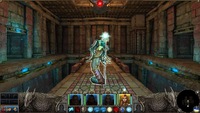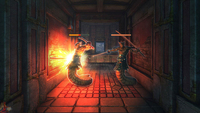|
|

|
PLATFORM
|
PC
|
BATTLE SYSTEM
|

|
INTERACTION
|

|
ORIGINALITY
|

|
STORY
|

|
MUSIC & SOUND
|

|
VISUALS
|

|
CHALLENGE
|
Easy
|
COMPLETION TIME
|
40-60 Hours
|
|
OVERALL

|
+ Strategic combat
+ Flexible, intuitive skill system
+ Mechanics all come together in dungeons
- Atrociously epicly unbelievable slowdown
- Grid movement in towns and open areas
|
Click here for scoring definitions
|
|
|
The legacy of the Might and Magic series isn't quite as straightforward as the other '80s RPG series that created the genre. The quality of the individual games was inconsistent, and changes to the gameplay between V and VI split fans into two camps who either claim the series peaked at World of Xeen before the game went gridless, or at Mandate of Heaven, the best of the gridless games. Picking the series up in 2014 becomes a tricky task for Limbic Entertainment: to make a game that felt like a Might and Magic title, fed the nostalgia of older gamers in both camps, appealed to series newcomers, and do this on a small budget. The end result, Might & Magic X: Legacy, is a successful tribute for better and for worse. Strategic and rewarding at times, ugly and boring at others, it's a reminder of why these games were popular in the '90s and also why they died out at the turn of the century.
Fittingly, it is the key decision to lock MMX:L's gameplay to a grid that will make or break the title for players. The entire world — towns, dungeons, and the massive outdoor area — is tiled, and movement is conducted through a clunky interface typical for first person crawlers. The party sits on a single tile, moving tank-like by strafing, turning, and stepping forward or backward. In the narrow dungeons where tiptoeing carefully to manage enemies is important, the controls work. In a friendly town, walking from one store to the next is a slow chore at best, a major exercise in patience at worst.
The largest exercise in patience comes in the outdoor area of the world. System slowdown is abysmal as the game tries desperately to render the entire region every time the party moves. It's noticeably worse near packs of enemies, suggesting that it's also trying to render all foes seen and unseen along with their animations. It can take several seconds to move from one tile to the next, and the most offensive areas are over twenty squares long. Once slain, enemies stay dead, so this becomes less of an issue later in the game, but some parts of the map will always have slowdown. There are other technical hiccups that don't get better, such as long load times and stuttering. It's a shame Limbic either couldn't resolve the technical problems before the release date or the code was too far down this path to overhaul it and stay in budget.
It's also sad that this strain on the Unity engine does not at least provide great visuals. Outdoor areas and towns have a generic vibe to them, like they were created from shared assets or pulled from a pool of art used for multiple games with forests, mountains, and houses. The detail is fine for a budget title, but the design is uninspired.
 Enjoy fighting a lone naga in the opening chapter while it lasts.
Enjoy fighting a lone naga in the opening chapter while it lasts.
|
|
Dungeons are where MMX:L shines. Tile movement is strategic and fun, the visuals are wonderful from thoughtful details to unique art, and there is no slowdown. They are also the most interesting, cohesive places in the game. Simple puzzles, journals, enemy types, and bosses work with a theme appropriate for each dungeon, and some of the dungeons have cool ideas and hidden shortcuts to keep the player engaged. Most are just small enough that they can be completed before they get tiresome.
The character-created party joined at the hip for around forty hours is made from twelve class options. The classes cover four races and three general specialties for each race: a might class, a magic class, and one that uses both. During character creation the player can view the classes' caps for each skill, using that as a guideline to guarantee a party with diverse talents and equipment needs later in the game. As a last bit of help, MMX:L suggests which skills are the most important to start with so you don't create a party incapable of making it out of the opening tutorial chapter. The options are thoughtful and diverse, and none are so specialized that the player can't find a use for them when the going gets tough.
The turn-based combat system is implemented in an unusual way and can be unforgiving. When the party and a foe are standing in adjacent tiles, the player will be locked in that spot until he is victorious or dead. There is no fleeing. In a turn, party members each get an action, then every foe aware of their presence gets an action. This means for each enemy turn, mages can cast spells at the party from several tiles away, melee characters attack, and nearby enemies run up to engage in a later turn. Given that most enemies have better stats than the good guys, getting swarmed is deadly, and the AI generally can't be kited. It makes combat in large battles exciting and intense. Dungeons slowly ramp up the difficulty until scripted ambushes of the toughest foes in the area force the player into the hardest battles possible.
 Old school invisible attack animation, I choose YOU!
Old school invisible attack animation, I choose YOU!
|
|
That said, the game overall isn't challenging. Most of the combat isn't against swarms of enemies, and once the world opens up a quarter of the way through the game, it's easy to get overleveled and overgeared by exploring every nook and cranny. Rare relic equipment levels up with the party and quickly makes combat easier, if they are found. Even without relics, the game feels balanced so that those who don't want to thoroughly explore the world, memorize the location of grandmaster trainers, or loot every chest can still complete it. Most of the optional content can be done in any order. If the main quest gets tough, explore outside to get stronger. If the party stumbles into an outdoor area with powerful enemies, wait and go back later.
While leveling, the flexible skill system works well. Exact stats like "chance to hit" are not displayed, however if a melee character is whiffing often, allocating points to attributes and skills that increase accuracy have a noticeable effect. Anyone paying attention to what is working and what isn't working in combat can adapt over a few levels and fix it. Skills also provide unique benefits such as inflicting status ailments and debuffs, providing buffs, taunting, and breaking enemy armor. Even melee classes can do much more than mindlessly hack away each turn. Class upgrade quests and grandmaster skill trainers lead to the most powerful specialization awards, but many skills are useful with only one skill point in them, so each level up screen offers a wide range of options to think about and plan ahead.
The pros and cons of Might and Magic X: Legacy are more straightforward here than they tend to be for the series. Tile movement in towns and horrendous slowdown outside are a major drag. Class, skill, gear, and attribute options are great and the freedom to create whatever you want is a boon. Dungeons are fantastic, well-planned, and fun. If the game was designed and coded to maximize the enjoyment of dungeons, Limbic could have structured the outdoor areas like smaller, linked dungeons and avoided many of the drawbacks. There are some minor weaknesses that can be written off as part of being old school or part of being a budget title: there's almost no voice acting, the background music is passable, and despite a deep, fleshed out lore and setting, the story isn't worth mentioning. The end result is a title that should appeal to fans of the series while enticing newcomers and gamers who weren't born in 1986, but large technical flaws and a drop-off in difficulty keep it from being the throwback gem it wants to be.
Review Archives
|









